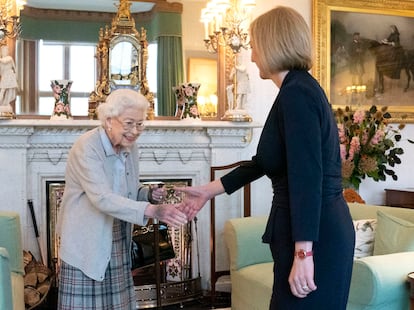The last hours of Elizabeth II’s reign: rumors, gestures and the slow spread of the news
The statement from the royal family regarding the monarch’s health gave rise to all kinds of theories as the media tried to find meaning in each public gesture

For at least two hours, only a few individuals knew for certain that the reign of Elizabeth II had ended. Between Buckingham Palace’s publication of the already historic note that stated that “the Queen’s doctors are concerned for Her Majesty’s health,” and the official announcement of her death, rumors, gestures and omissions contributed to the collective sense that, this time, the news was true.
Many noticed the warning signs. In the two photographs that the Royal Family published on Tuesday of the queen’s meetings with Boris Johnson and Liz Truss, Elizabeth II’s hands had an intense purple color. The British tabloids speculated about the causes: lack of oxygen in the blood, the effect of the cold of the Scottish Highlands on an elderly person. Still, there remained the widespread sense of security that the queen would continue to be a regular presence and that the country should get used to her ailments and a reduction in her public appearances.
The monarch’s decision to receive both Johnson and Truss at Balmoral Castle – and thus break the tradition of performing this ritual at London’s Buckingham Palace – was justified by the “mobility problems” that she had been suffering for months. That day’s announcement that there would be no meeting with the Privy Council the following day, despite the fact that it was scheduled to be televised, set off alarms. The day had not been so intense that the monarch would need to rest. Over the summer, the media had revealed how Prince Charles – today Charles III – had increased his visits to his mother at Balmoral, calling on her nearly every day. The careful attention suggested health problems for the monarch.
The telling gestures
On Thursday, when Buckingham Palace published the note on Elizabeth II’s worsening health, the new prime minister announced in Parliament her plan for urgent measures to deal with the energy crisis. The speaker of the House of Commons, Lindsay Hoyle, expressed words of support for the monarch. Meanwhile, Nadhim Zahawi, the minister in charge of the Cabinet Office, which coordinates government tasks, slipped Truss a note that changed the Prime Minister’s countenance. Angela Rayner, the number two of the Labour opposition, also received a note and looked up confused, not sure if the ongoing energy debate should go ahead.
Charles and his mother
Charles and his wife, Camilla, arrived at Balmoral from nearby Birkhall. The queen’s son was able to accompany her during her last hours. The note about her health described her state as “comfortable,” suggesting palliative care in her last moments.
The rest of the royal family – Princess Anne, Princes Andrew and Edward, William and Henry – set out for Balmoral. Their urgency to arrive left little room for interpretation. Something serious was happening, although Buckingham kept silent for six hours.
Then the BBC interrupted programming. It adopted a sober tone. Presenters and journalists adapted their wardrobe to the mourning that was approaching, donning dark blue and black ties. The title at the bottom of the screen read “The health of the Queen.” The public broadcaster avoided any speculation, restricting itself to commenting on the figure of Elizabeth II.
The first communique
It was at half-past four in the afternoon when Buckingham activated the protocol and informed Truss – the first to know – of the death of Elizabeth II. Two more hours would pass before the Royal Family’s official website made the news public. During that time, the circle of those who knew the news expanded. Rumors and leaks began to make the rounds. This correspondent received messages from two relevant sources, which assured him that the queen’s death had already occurred. The Washington Post soon assured that the death had occurred at 3pm.
All of Elizabeth II’s children, and two of her grandchildren, gathered at Balmoral Castle. But only Charles and his sister Anne, according to The Daily Telegraph, were present at the time of death. For two or three hours, the British, and the rest of the world, clung only to an intuition to confirm the passing of the queen.
Tu suscripción se está usando en otro dispositivo
¿Quieres añadir otro usuario a tu suscripción?
Si continúas leyendo en este dispositivo, no se podrá leer en el otro.
FlechaTu suscripción se está usando en otro dispositivo y solo puedes acceder a EL PAÍS desde un dispositivo a la vez.
Si quieres compartir tu cuenta, cambia tu suscripción a la modalidad Premium, así podrás añadir otro usuario. Cada uno accederá con su propia cuenta de email, lo que os permitirá personalizar vuestra experiencia en EL PAÍS.
¿Tienes una suscripción de empresa? Accede aquí para contratar más cuentas.
En el caso de no saber quién está usando tu cuenta, te recomendamos cambiar tu contraseña aquí.
Si decides continuar compartiendo tu cuenta, este mensaje se mostrará en tu dispositivo y en el de la otra persona que está usando tu cuenta de forma indefinida, afectando a tu experiencia de lectura. Puedes consultar aquí los términos y condiciones de la suscripción digital.









































